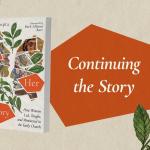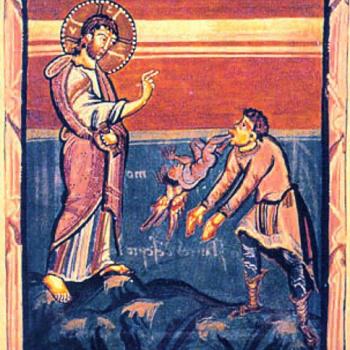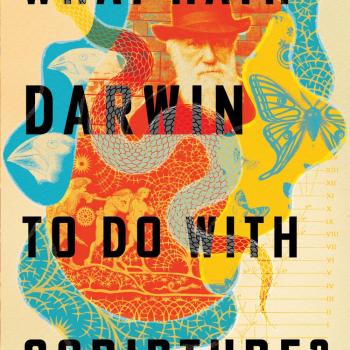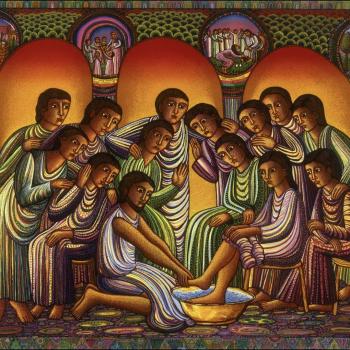My friend Dr. Matt Lynch (Regent College, CAN) has written an excellent new book FLOOD AND FURY. Matt was kind enough to write some of his thoughts out in brief. Check it out and then read the book! ~Nijay
 The “Wicked Problem” of Violence in the Old Testament
The “Wicked Problem” of Violence in the Old Testament
By Matthew J. Lynch
I’ve sometimes asked my students what comes to mind when they hear the phrase “The God of the Old Testament.” Words like wrath, anger, violence, judgement, and even hate are often shared. To be sure, some also associate God with mercy and salvation, but the imbalance toward the “negative” attributes is telling. This image of an angry and violent God features prominently in the intro to Christianity Today’s podcast The Rise and Fall of Mars Hill, where Mark Driscoll expresses his desire to “go Old Testament” on a few members of his church—an overt reference to violence.
Many would balk at the idea of equating Old Testament with violence. But what of the many texts that show God acting violently or commending violence within Israel? Isn’t the idea of God drowning 99.999% of his creatures in the Flood, or commanding the destruction of the Canaanites, inimical to the teachings of Jesus?
The rush to resolve this perceived disconnect between the violence of God in the Old Testament can lead to two major missteps that I aim to address in my book Flood and Fury.
First, some think that if they find the right “approach” (or model, or theory) they’ll be able to puzzle through this thorny issue. For instance, they might adopt a Christocentric approach that takes Jesus’ teachings about enemy love as the evaluative standard for judging Old Testament texts as worthy of God or in need of reinterpretation. Or, they might claim that because God commanded wars of extermination, that settles matters and we need to deal with it (= Divine Command Theory). But as I suggest in the book, each proposed model for addressing violence has serious flaws and limits.
Second, some allow questions about violence set all the terms of the discussion. If you start with the question—How can a loving God command genocide against entire people groups?—you’ve already made several decisions about the command, the inclusion of all people groups, the nature of Joshua’s violence, and so on. The risk here is that our questions distort our field of vision, leading us to misconstrue the problem itself.
Against these missteps I suggest the following: First, we need field-adaptive flexibility that draws from various models but attends to the model-defying qualities of the Old Testament. It’s full of surprises, and should be approached with an expectation of the unexpected! Second, we need to ensure that our questions don’t over-determine our findings by attending carefully to the text itself. That helps us avoid using the misdiagnosing the problem. Giving someone CPR when they need the Heimlich ain’t too helpful!
Flood and Fury
I focus on the Great Flood (Gen 6-8) and Canaanite Conquest (Josh 1-12) as case studies. In my teaching, they’re the stories that most often pose challenges for students. Attending carefully to these stories does indeed yield surprises!
For example, the flood narrative never mentions divine anger or judgement, only grief (Gen 6:6-7). Moreover, the story insists that the earth was ruined before the flood. Notice Genesis 6:11-12:
The earth was ruined in God’s sight. The earth was full of violence.
God saw the earth, and behold, it was ruined,
because all flesh had ruined its ways upon the earth.
This assessment represents an inversion of Genesis 1:31, where we read:
God saw all that he had made, and behold, it was very good.
According to Genesis 6:11-12, creation-consuming violence destroyed creation before the flood even began. That puts the significance of the flood in a different light. Of course, questions remain about God’s role in these events (6:13), the historicity of the flood, and much more that I discuss in the book.
A careful read of Joshua raises serious questions that challenge a surface-level genocidal reading of the book. If the threat of Canaanite idolatry provided the justification for the conquest, why do we find out at the end of the book that Israel still had idols among them (Josh 24:14, 23)? If circumcision was the sign of the covenant, without which people were to be cut off from the community (Gen 17:14), why did Israel enter the land uncircumcised (Josh 5)? Why does Joshua suggest on the one hand that the conquest was utterly complete and successful (Josh 11:23; 21:43-45; 24:11), yet on the other hand, Canaanites were still everywhere, and vast areas unconquered (Josh 13:1; 16:10; 17:12)? Why do some texts suggest a slow process of Canaanite displacement (Josh 11:18) and others a Blitzkrieg (10:42)? Why does the story feature Rahab so prominently (Josh 2, 6)? What happens when we read Joshua in the light of Egypt’s ongoing control of Canaan in the Late Bronze Age?
Attending to Joshua’s rich and complex story complicates binary questions like, Was it genocide or not? Did it happen or not? I argue in the book that Joshua is designed to be read multiple times. Second and third readings challenge many impressions that a quick reading might give. For example, Joshua 24:11 suggests that Jericho may have attacked Israel, initiating the battle. This scenario fits with how the book portrays all other battles except against Ai. Joshua 10:40 claims that Israel left nothing alive that breathes in Hebron, yet Joshua and Judges later indicate that Canaanites still held the city after those battles (Josh 15:14; Judg 1:10-11, 17). These are just a few examples of the book’s tendency to speak in totalizing terms and then add bombshell caveats. Wrestling with these conflicting claims about violence formed a significant part of my section on Joshua.
A Wicked Problem
Part of what I hope my book achieves is an appreciation for the rich and nuanced stories that bear the very problems we seek to confront. A correlate of that appreciation is a healthy suspicion toward single-model solutions to the problems of violence in the Old Testament. Straightforward solutions have serious hidden costs, that I hope readers can grapple with. Rather than single-model solutions, I propose reckoning with the problem of violence as a wicked problem. Wicked problems aren’t wicked because they’re evil, but because they’re resistant to resolution. Unlike a benign problem, like a math equation, wicked problems don’t yield to single strategies or methods. For instance, poverty is a wicked problem because of its complex interconnection with education, economics, health, geography, politics and policies, race and gender, and so on. There’s no agreement on how to define poverty or its lead causes. And how would we know if we solved it?
But in the face of wicked problems like poverty, we don’t just relinquish responsibility and say, “There’s no use trying!” The choice is not between a tight solution and total resignation. My book wrestles through the wicked problem of violence in the Old Testament as a wicked problem, and aims to show that there are gains to be made besides solving that problem. Perhaps we discover that the Bible’s violent stories aren’t as straightforwardly horrific as we thought. Or perhaps we find companions who share our concerns with the Bible. Or perhaps we find that stories like the Flood and Conquest hold more Good News than we ever imagined.
So let’s abandon the hunt for a single strategy to the problem of violence and enter the real world of Scripture’s violence. If such Old Testament stories formed part of the curriculum for Jesus’ education, they might even lead us toward the shalom-engendering vision he embraced and taught.













